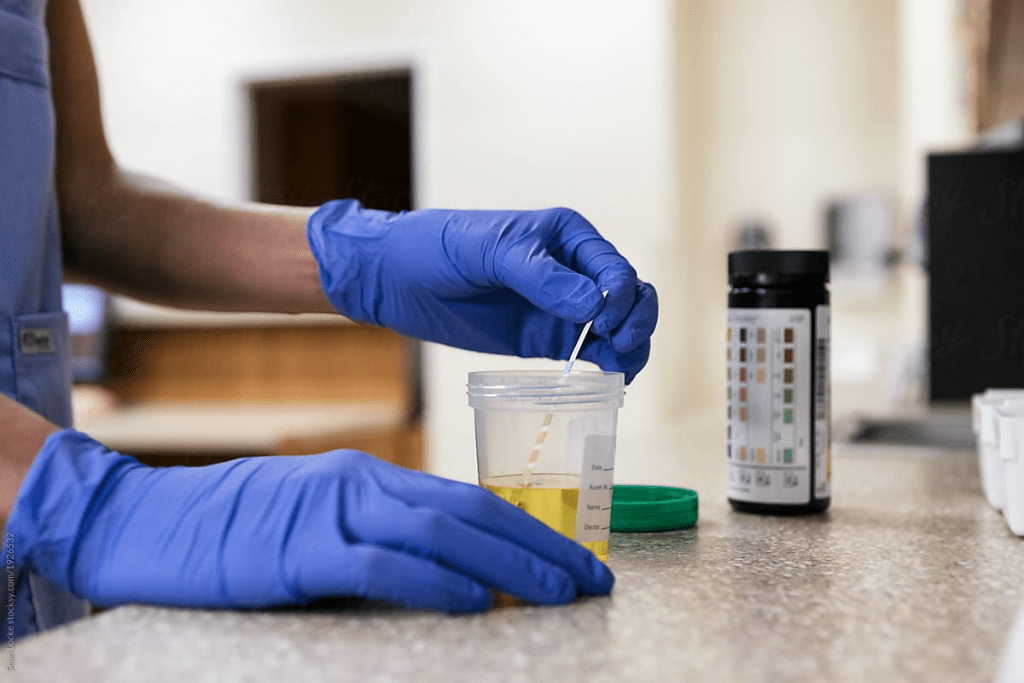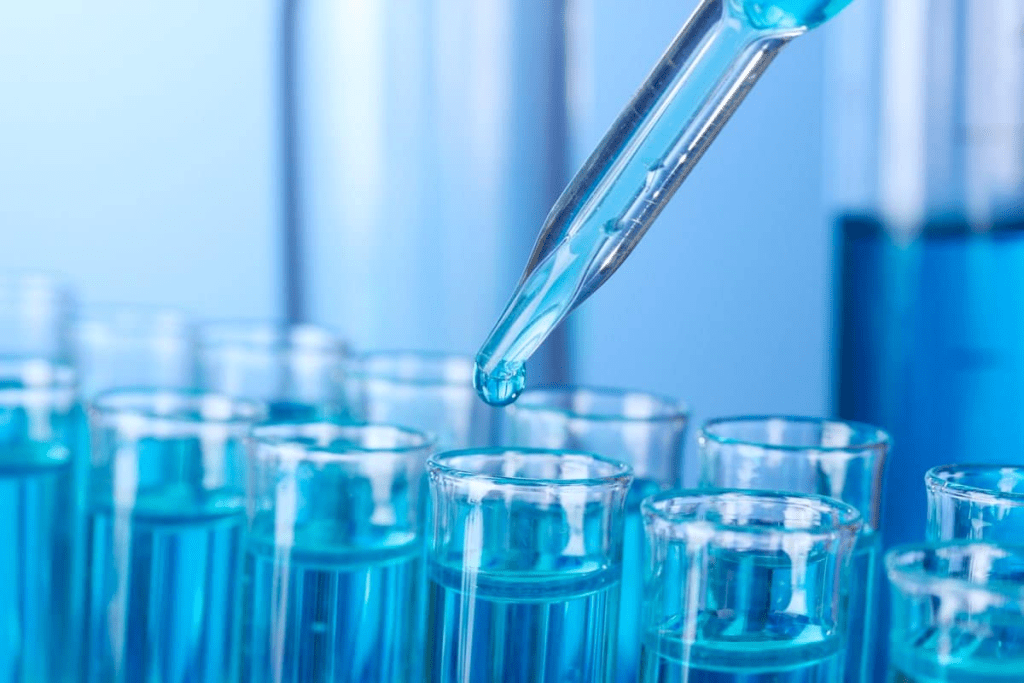Last Updated on November 25, 2025 by
Drinking too much water before a urine test can harm your health and the test’s accuracy. A urinalysis checks your urine through a visual exam, dipstick test, and microscopic exam. The dipstick test includes checking for leukocyte esterase, an enzyme that indicates the presence of white blood cells and may suggest a urinary tract infection or inflammation.

Drinking over 1“1.5 liters (34“50 oz) of water quickly can make your urine too diluted. This affects the urine specific gravity. It’s key in showing how concentrated your urine is.
Too much water can make your urine sample too diluted. This might lead to wrong test results. It’s important to understand the clarity meaning and clarity definition of these results.
Urinalysis is a common test that shows how well hydrated you are. Knowing how hydration affects urine tests is key to correct diagnoses.
Urinalysis helps doctors check for many health issues,ike kidney disease and diabetes. It looks at the urine’s physical, chemical, and microscopic details. This test shows how well your body is working, how hydrated you are, and if there are any problems.
The specific gravity of urine should be between 1.015 and 1.030. This shows how well your kidneys are working. Drinking too much water can make your urine too diluted, which is not good.

How much water you drink changes your urine’s makeup. Drinking enough water keeps your body balanced. But drinking too much can make your urine too diluted, which can mess up test results.
It’s important to drink just the right amount of water before a urine test. This ensures your test results are accurate and helpful for your health.
Too much water can change urine test results. This is due to factors like specific gravity and creatinine levels. Knowing how water dilutes urine is key to understanding test results.

Specific gravity shows how concentrated urine is. Too much water makes urine less concentrated. This can make test results accurate.
Drinking too much water before a test can make urine more diluted. This affects levels of white blood cells, nitrite, and epithelial cells. Labs check specific gravity to see if urine is diluted.
Creatinine is a waste from muscle wear and tear. It helps show if urine is diluted. A valid urine sample has creatinine between 2 mg/dL and 20 mg/dL. Too low means the sample is too diluted.
Creatinine levels are key to urine test validity. If they’re not in range, test results might not be trusted.
Research shows drinking too much water before a test can skew results. Drinking lots of water can make urine too diluted. This can hide substances like nitrite and white blood cells. Healthcare pros need to know this to read test results correctly
Understanding water dilution and its effects on urine tests helps healthcare professionals. They can make better diagnoses. It’s important to stay hydrated safely before a urine test for accurate results.
Drinking too much water before a urine test can change the test results. Leukocyte esterase, found in white blood cells, is key to spotting urinary tract infections (UTIs). Too much water can make the leukocyte esterase in the urine sample less concentrated.
Drinking too much water can greatly affect leukocyte esterase readings. The urine gets diluted, which can cause false negative results. This is because the leukocyte esterase might not be detected by UTI test strips. This can lead to missing or delaying the diagnosis of UTIs.
Excessive water also affects the detection of other urine test components. This includes nitrite, epithelial cells, and white blood cells. Nitrite shows bacterial infections, and it’s used with leukocyte esterase to diagnose UTIs. Dilution can lower the levels of these markers, causing false negatives.
The risk of getting false negative results is a big worry when looking at urine test results. If the urine is too diluted, it might not show infections or diseases accurately. This can be very serious because untreated UTIs can cause bigger problems. So, it’s important to drink the right amount of water before a urine test to get accurate results.
Drinking too much water before a urine test can be dangerous. It can cause water intoxication and hyponatremia. Hyponatremia is when the sodium in your blood gets too diluted.
Drinking more than 1“1.5 liters of water quickly can be risky. Water intoxication happens when you drink too much water. This can upset the balance of electrolytes in your body.
Hyponatremia is when your blood’s sodium levels drop too low. This can swell your brain and be very dangerous.
Both water intoxication and hyponatremia are serious and need quick medical help. The danger is higher if you drink a lot of water fast, more than your body can handle.
The signs of drinking too much water can be different. They often include nausea, vomiting, and headaches. In serious cases, you might have seizures, muscle weakness, and confusion.
To stay safe, follow good hydration tips. Drink water in moderation. It’s best to drink when you’re thirsty and watch your urine color.
If your urine is pale yellow or clear, you’re hydrated. For a urine test, drink water normally, but don’t overdo it. Knowing how clear or dark your urine is can tell you if you’re drinking too much or too little.
It’s all about finding a balance. You want to be hydrated enough for the test but not so much that it’s harmful. Paying attention to urine specific gravity can also help you understand if you’re drinking too much water.
Drinking too much water before a urine test can change the results. This can lead to wrong diagnoses. It’s important to know how drinking water affects urine tests, like specific gravity and leukocyte esterase levels.UTI test strips are used to find health issues in urine. But if the urine is too diluted, these tests might not work properly. This can cause false negatives, hiding real health problems.
To get accurate urine test results, it’s key to follow safe water drinking rules before the test. Knowing how much water to drink can help avoid problems like water poisoning and low sodium levels.
By drinking water wisely, people can help make sure their urine tests are correct. This helps in getting better health results.
The specific gravity of urine shows its concentration. Drinking too much water can make the urine appear diluted. This can lead to wrong test results.
Drinking a lot of water changes the urine’s concentration. Too much water can make the urine too diluted. This might give wrong test results.
Urinalysis is a test to find health problems. Knowing how hydration affects urine is key to accurate results.
Normal urine concentration levels vary. But too much water can make the urine too diluted. This can lead to wrong test results.
Drinking too much water can dilute the urine. This might hide leukocyte esterase, a sign of urinary tract infections.
Drinking too much water before a test can be risky. It can cause water intoxication and hyponatremia.
Too much water can cause headaches, nausea, and vomiting. These are signs of water intoxication and hyponatremia.
It’s important to stay hydrated, but not too much. Drinking water in moderation is best to avoid health risks.
Dilution can hide nitrite, epithelial cells, and white blood cells. This might give false negative results.
Creatinine levels help show if urine is diluted. They are important for checking dilution.
Clarity means how clear the urine is. Too much water can make the urine less clear. This might lead to wrong test results.
A manual cup is used to collect urine. This traditional method can be affected by too much water. It might not be as accurate.
Too much water can dilute the urine. This might make UTI test strips less accurate. They are used to find urinary tract infections.
Dilution of urine caused by excessive water intake before a urine test can significantly impact the accuracy of the results, potentially leading to false negatives for conditions like urinary tract infections (UTIs) or skewed measurements of key components like specific gravity and creatinine. This can hinder a correct diagnosis and lead to serious health consequences if an underlying condition is missed.
Subscribe to our e-newsletter to stay informed about the latest innovations in the world of health and exclusive offers!